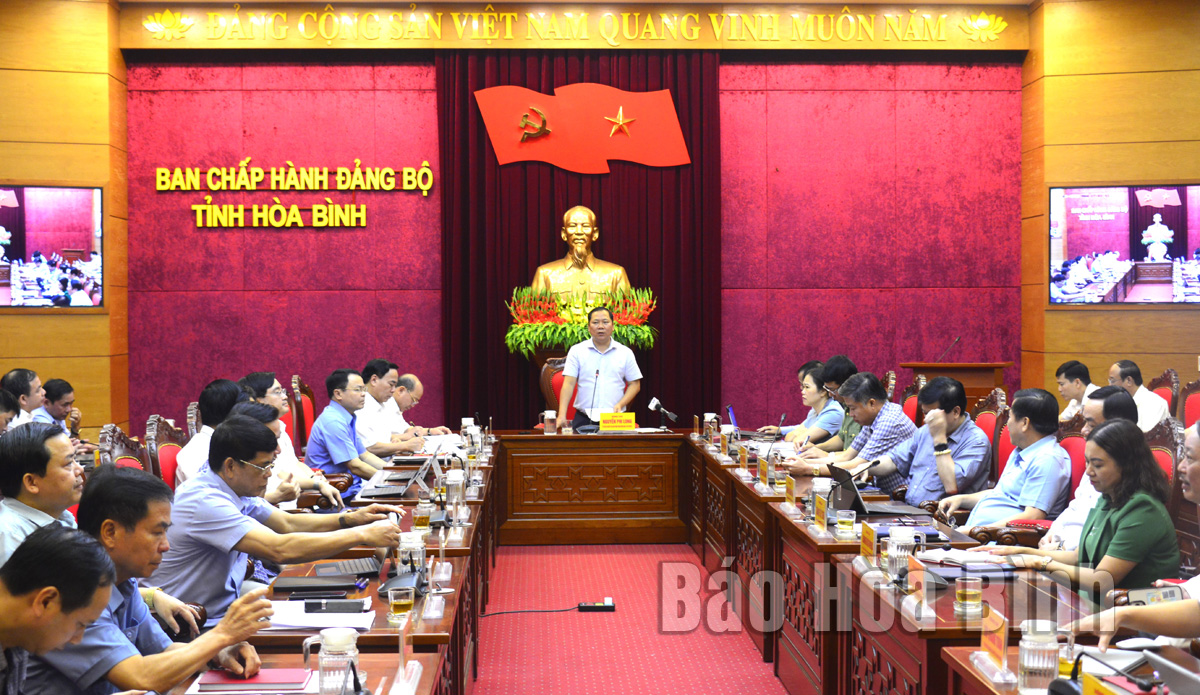
(HBO) – The Hoa Binh provincial Party Committee on August 25 held a meeting on the investment plan and commitment to allocate budget for the project of expanding Hoa Lac - Hoa Binh road.

Nguyen Phi Long,
alternate member of the Party Central Committee and Secretary of the provincial
Party Committee, speaks at the meeting.
At the meeting, Bui Duc Hinh, Deputy Secretary of the provincial Party
Committee and chairman of the provincial People's Council, introduced a
proposal by the Standing Board of the provincial Party Committee on the
expansion of the Hoa Lac - Hoa Binh road project under a Public-Private
Partnership (PPP) contract.
The project has a total investment of nearly 9.4 trillion VND
(389 million USD) to build a 23.4-km road including a 6.37-km section in Hanoi
and a 16.67-km one in Hoa Binh province. The province has chosen to invest in the construction of a 6-lane expressway
with a design speed of 100km per hour.
Participants in the meeting agreed that the investment project
to build the Hoa Lac - Hoa Binh road is an important work that has great impact
on the socio-economic development of the locality and the northwestern region.
It will open up traffic and create a new economic corridor in the region. The provincial Party Committee agreed on the scale and contract
form of the project as well the funding plan for it.
Concluding the meeting, alternate member of the Central Committee of the Party
and Secretary of the provincial Party Committee Nguyen Phi Long spoke highly of
the support and determination of the provincial Party Committee to implement
the project.
He agreed that the project has strategic significance in
connecting trade between the province and key economic regions and Hanoi,
contributing to attracting investment and promoting the socio-economic
development of the province and the region.
The provincial People's Committee, its departments, and relevant agencies were
asked to work with ministries and central agencies to ask competent agencies
for permission to implement the project according to regulations.
The Standing Board of the Hoa Binh provincial Party Committee has agreed in principle on a proposal by the Standing Board of the Party Committee of Hoa Binh city to gather feedback on the city’s 1:2000 zoning plan, which forms part of its broader urban development strategy.
Hoa Binh province has made notable progress in public administration reform and digital government development, with the satisfaction index among citizens and businesses reaching over 84%, according to recent government evaluations.
Thanks to great efforts by local authorities in recent times, the governance and public administration performance of Mai Chau district has been significantly improved.
In the afternoon of June 6, the Party Committee, the People's Council, the People's Committee and the Fatherland Front of Lac Son district solemnly held a meeting to celebrate the 139th anniversary of the district's founding (1886–2025) and the 79th anniversary of the establishment of the district's Party Committee (1946–2025). There was the attendance of Mr. Bui Van Thang, the Vice Chairman of the Provincial People's Council; Mr. Quach Tat Liem, the Vice Chairman of the Provincial People's Committee; Ms. Dang Bich Ngoc, the Deputy Head of the National Assembly Delegation of the province; as well as the former leaders of the province and district through various periods, who are the natives of the district.
Implementing the Politburo’s Resolution No. 57-NQ/TW on breakthroughs in science – technology, innovation, and digital transformation is a golden opportunity for the northern mountainous province of Hoa Binh to renew growth model, improve competitive edge and shorten digital gap.
Resolution 57-NQ/TW, issued by the Politburo on December 22, 2024, identifies sci-tech, innovation, and digital transformation as strategic breakthroughs to build a developed and prosperous nation. In Hoa Binh province, this spirit is not just a slogan, it’s being put into action through concrete initiatives that form a "new development triangle”: digital citizenship, digital economy, and digital administration.



